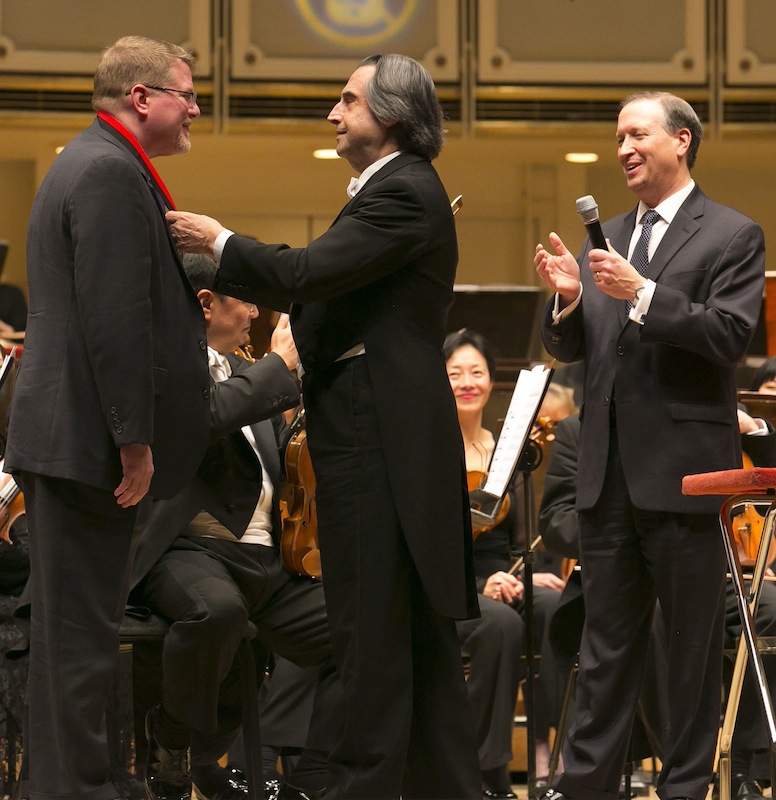Muti and CSO score with Ligeti and Tchaik rarities

Repertory from the second half of the 20th century has not exactly been bountiful in Riccardo Muti’s programs to date. So much so that it seemed almost amazing that Muti led off this week’s Chicago Symphony Orchestra concert with music of György Ligeti Thursday night.
Unlike some of the Hungarian composer’s more anarchic works like the “anti-opera” Le Grand Macabre, Ligeti’s Lontano from 1967 inhabits a style closer to his Atmospheres, written a few years earlier and celebrated for its usage in Kubrick’s 2001.
Spanning just 12 minutes, Lontano begins and ends on the edge of audibility, adding volume and instrumental layers almost imperceptibly yet with powerful inexorability. There is a sense of near-stasis yet with massive concentrated strength in reserve, as this haunting, unsettling music grows to a climax and then descends.
Muti’s gift for balancing and scrupulous dynamic control was on full display here, drawing a bare sliver of sound in the opening bars, and building the long crescendo with great skill. The orchestra playing was on a supreme level, with the high string harmonics and violin tremolos intense and precise.
One wishes the CSO’s music director would favor Chicago audiences with challenging repertory like this more often. Too bad the rude, clueless coughers didn’t allow the hushed quiet of the work to register.
Muti’s season-long Tchaikovsky cycle started well and has only gotten better with each installment. Last week’s “Pathetique” set the bar high and Thursday night’s performance of Tchaikovsky’s Symphony No. 2, “Little Russian,” was on the same level.
The Second is the finest of the early Tchaikovsky symphonies–musically unified, chock full of melody and deftly balancing the composer’s lyricism and virtuosic fire.
Muti led a performance that ideally blended tonal sheen, charm and bravura. There was a light balletic lilt to the perky march-like theme of the second movement, later rendered with martial swagger, and a beautifully turned diminuendo at the coda. The restless bustle of the ensuing Scherzo made fine contrast with the Chicago-born guest flutist Demarre McGill floating graceful arabesques in the bucolic trio section.
The finale has moments of bombast but proved undeniably thrilling Thursday, with Muti and the players ratcheting up the adrenaline as the insistent main theme builds to its fiery coda. There was inspired playing across all sections, with special kudos to Dan Gingrich’s elegant horn solo in the opening movement.
The evening’s centerpiece was Beethoven’s “Triple” Concerto, with guest pianist Jonathan Biss joining assistant principal cellist Kenneth Olsen and associate concertmaster Stephanie Jeong.
Beethoven’s Op. 56 is not among the composer’s most timeless works—repetitive, awkwardly laid out, and with rather trite thematic material. It takes a trio of soloists that can play with cohesion yet offer enough individual musical personality to ride over the extended sections of rum-ti-tum.
That didn’t happen Thursday night. Muti and the orchestra provided tempered and finely honed support that made the work seem stronger than it is.
But musical sparks and ensemble unity were fitful at best from the soloists. Biss provided the most consistent playing with sturdy reliability and understated virtuosity, throwing off caution in the whirlwind coda.
In her CSO solo debut, Jeong’s silvery-sweet violin timbre always fell gratefully on the ear. Yet her playing was also rather faceless and efficient, wanting more variety in her vibrato and phrasing.
At least Jeong played with polish and technical assurance, which is more than could be said of her cello colleague. Olsen brought a spontaneous lyrical impulse to the music, playing with burnished warmth in the opening of the Largo. Unfortunately, he also contributed repeated technical lapses, with pinched tone, unsteady passagework and more jarringly wayward intonation than one expects from a front-desk musician in a major orchestra.
_________
David McGill, who retired as CSO principal bassoonist last summer, was awarded with the Theodore Thomas Medallion for Distinguished Service on stage Thursday night. The presentation was made by CSO president Jeff Alexander and Muti, spiced with the music director’s characteristic mix of humor and affection.
McGill served as CSO principal bassoonist from 1997-2014, and previously was principal of the Cleveland Orchestra from 1988. He now teaches at the Bienen School of Music at Northwestern University.
The program will be repeated 8 p.m. Saturday. cso.org; 312-294-3000.
Posted in Performances

